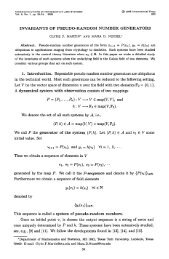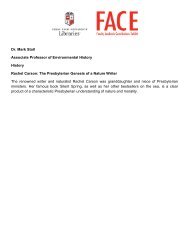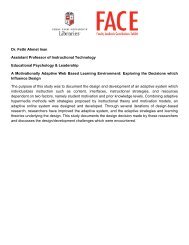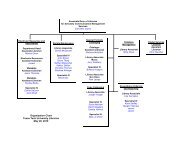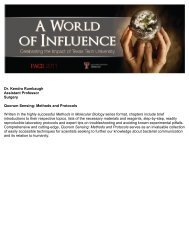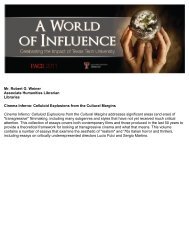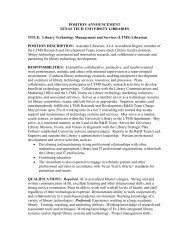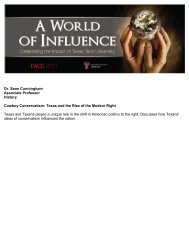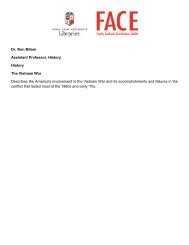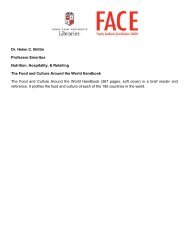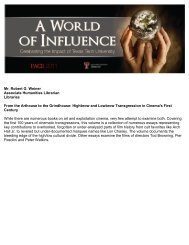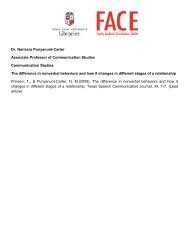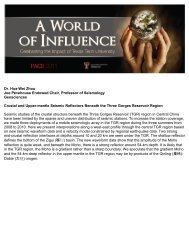Nonprofit Organizations Law and Policy Third Edition - Libraries ...
Nonprofit Organizations Law and Policy Third Edition - Libraries ...
Nonprofit Organizations Law and Policy Third Edition - Libraries ...
You also want an ePaper? Increase the reach of your titles
YUMPU automatically turns print PDFs into web optimized ePapers that Google loves.
SEC. II ORGANIZATIONAL STRUCTURE 35<br />
------<br />
trust pursuant to any charitable trust, (b) any corporation which has<br />
accepted property to be used for a particular charitable corporate purpose<br />
as distinguished from the general purposes of the corporation, <strong>and</strong> (c) a<br />
corporation formed for the administration of a charitable trust, pursuant<br />
to the directions of the settlor or at the instance of the trustee."<br />
Section 12582.1 defines charitable corporations as follows: " 'Charitable<br />
corporation' means any nonprofit corporation organized under the<br />
laws of this State for charitable or eleemosynary purposes <strong>and</strong> any similar<br />
foreign corporation doing business or holding property in this State for<br />
such purposes."<br />
Thus, the question before us becomes whether the Wisdom Society<br />
was organized for "charitable or eleemosynary purposes."<br />
The law is clear that a nonprofit corporation organized for the<br />
advancement of the education is a charitable corporation. * * *<br />
A reading of the articles of incorporation as a whole should determine<br />
the real purpose of a particular institution, but its character is not to be<br />
determined alone by the powers <strong>and</strong> purposes defined in its articles, but<br />
also by the method of transacting business. * * * The court can take into<br />
consideration the actual conduct of the corporation in its method of<br />
operation. * * * In the case at bar, a reading of the Wisdom Society's<br />
articles of incorporation as a whole, indicates that the Wisdom Society was<br />
formed for educational purposes, for the advancement of knowledge, <strong>and</strong><br />
the educational welfare of mankind. And when we examine the actual<br />
conduct of the Wisdom Society, its method of operation <strong>and</strong> its procedure<br />
for transacting business, we see that the corporation was conducted as a<br />
charitable corporation in that it was dedicated to disseminating publications<br />
of strictly an educational nature, i. e., its publications were limited to<br />
informing readers on many literary, philosophical, religious, scientific,<br />
historical, political <strong>and</strong> other subjects.<br />
In the case at bench, both the purposes as set forth in articles of<br />
incorporation <strong>and</strong> also the actual conduct of Wisdom were more than<br />
sufficient to sustain the action of the trial court in its conclusion that the<br />
Wisdom Society is a charitable corporation.<br />
* * *<br />
Although nonprofit corporations are certainly not synonymous with<br />
charitable corporations, a nonprofit corporation whose purpose is educational<br />
has been held a charitable corporation in Estate of Connolly<br />
(1975) 48 Cal.App.3d 129, 121 Cal.Rptr. 325. Furthermore, an educational<br />
purpose related to learning has been held to be a charitable use, * * * <strong>and</strong><br />
a trust for promotion of education generally is charitable in nature. * * *<br />
Therefore, the conclusion of law that a corporation is a charitable corporation<br />
follows from the fact that a nonprofit corporation is created for or<br />
devoted to educational purposes. * * *<br />
Appellants argue that the statutory scheme classifying nonprofit<br />
corporations differentiates between educational corporations <strong>and</strong> charita-



